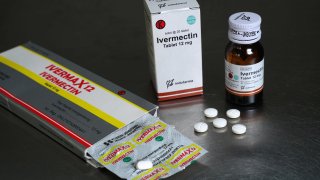
- A team of scientists affiliated with Duke University found that ivermectin does not meaningfully improve the recovery of people with mild to moderate Covid.
- "These findings do not support the use of ivermectin in patients with mild to moderate COVID-19," they concluded.
- A previous study found that ivermectin does not lower the risk of hospitalization from Covid.
- The FDA has warned people against taking the tablets for anything other than their approved use.
Ivermectin, a drug once touted by conservatives as a treatment for Covid, does not meaningfully improve the recovery time for people with mild to moderate cases, according a large clinical trial published in a peer-reviewed journal.
People who took ivermectin recovered from Covid in 12 days while people who didn't take the drug recovered in 13 days, according to the study published in the Journal of the American Medical Association on Friday. Ivermectin has been approved to treat parasitic worms in humans, but it's primarily used as a dewormer for horses.
"Among outpatients with mild to moderate COVID-19, treatment with ivermectin, compared with placebo, did not significantly improve time to recovery," the team of scientists led by Duke University School of Medicine wrote. "These findings do not support the use of ivermectin in patients with mild to moderate COVID-19," they concluded.
Early on in the pandemic when there were few treatment options, ivermectin gained national notoriety when a couple of groups of conservative doctors, including Front Line COVID-19 Critical Care Alliance and America's Frontline Doctors began touting the drug on social media and elsewhere as a treatment for Covid. But there was little data backing up those claims and a study by Dr. Pierre Kory, a critical care physician in Wisconsin and president of the critical care alliance, claiming it was an effective treatment was later retracted for having flawed data.
The latest trial looked at 817 people who took ivermectin tablets for three days and compared them to 774 who received a placebo. The participants who took ivermectin received a daily dose based on their weight. Recovery from Covid was defined as three consecutive days without symptoms.
One person died in the ivermectin group while not one person who received the placebo passed away. The number of people hospitalized in each group was the same at nine participants each.
Money Report
The study was conducted across 93 sites in the U.S. from June 2021 through May 2022 when the delta variant and then the omicron strain were dominant.
The Food and Drug Administration has not authorized ivermectin for treating or preventing Covid and has repeatedly warned people against taking the drug for anything other than its approved purpose.
Feeling out of the loop? We'll catch you up on the Chicago news you need to know. Sign up for the weekly> Chicago Catch-Up newsletter.
Public interest in ivermectin spiked early in the pandemic when a lab study indicated that the drug slowed replication of the virus that causes Covid in a petri dish. But several trials have now found that ivermectin does not provide any meaningful benefit for patients against Covid.
A study in the New England Journal of Medicine, published in May, found that ivermectin did not lower the risk of hospitalization from Covid.
Ivermectin is approved in the U.S. in a liquid or paste form to treat parasites in animals. There is also a tablet version that is FDA approved to treat parasitic worms, head lice and some skin conditions in people.
"There's a lot of misinformation around, and you may have heard that it's okay to take large doses of ivermectin. It is not okay," the FDA says on its website, warning people that they could overdose.
The drug regulator also sternly warned people against taking ivermectin formulations designed for animals such as horses and cows.
"For one thing, animal drugs are often highly concentrated because they are used for large animals like horses and cows, which weigh a lot more than we do— up to a ton or more. Such high doses can be highly toxic in humans," the FDA says.






